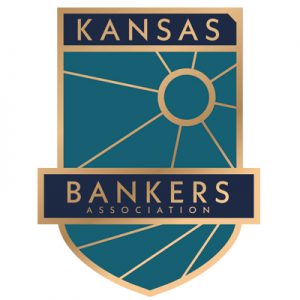Beyond lending to local businesses and households, smaller banks often serve key leadership roles in their communities. These bankers sit on the boards of local schools, hospitals and other civic organizations, not only meeting the credit needs of their local communities but they are also an integral part of them.
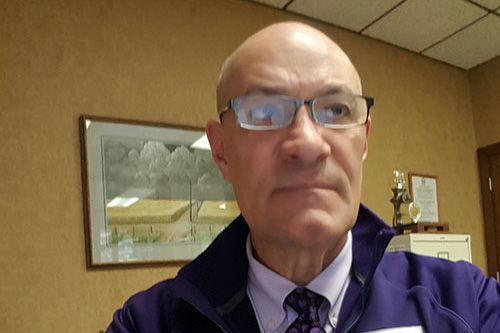

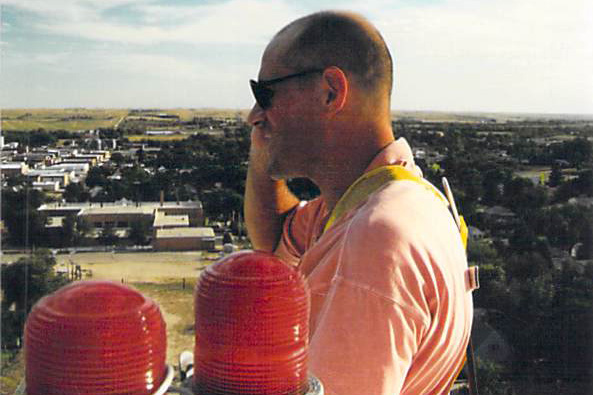
Shop Local to Get Ahead
Gary J. Walter
Chairman, The Bank, Oberlin, Kansas
Gary J. Walter, Chairman at The Bank in Oberlin, started out in banking in 1982 at the Decatur County National Bank in Oberlin. The failed Decatur County National Bank was eventually bought in 1985 by The Bank when Walter became Vice President. Before starting in banking, Walter liked to tell people and joke that he was a special agent for the FBI (it was actually Farm Bureau Insurance, not the Federal Bureau of Investigation). Walter had originally moved from Manhattan with his family to Oberlin since both he and his wife’s parents lived in St. Francis, and they could help them as needed.
Walter was elected to the Oberlin City Council Board in 1997, and as he was reelected for a second term in 2001, the current mayor at the time decided to resign. Since the resignation was during a term, Walter needed to step into the Mayor’s seat from his position as Board President. He served as Mayor until April 17, 2003, when he handed the seat off to the next mayor, Ken Shobe.
In becoming Mayor and bringing his banking experience with him, Walter said one thing he thought was, “I am a banker, and I don’t like surprises.” This came from an instance where a city employee was called out in an open meeting when neither the Mayor nor the City Administrator were aware of the concern. Walter had made the comment at the meeting that there was no allowable reason that someone would do that, and if there was a concern, there were avenues to go through to the City Administrator and through the Mayor before bringing it up in a meeting that, at the time, was being televised on the local cable channel to the whole community. With this vision of transparency, Walter did not want to be blindsided by an issue.
His experience in banking helped him in being Mayor by exposing him to the financial sector, such as the finances of the city.
“Both of these roles have entities that have to work together toward the common goal,” Walter said. “Which is to have everything run properly and not be foul of any problems.”
These two experiences had many parts working together, and as with banking, the city had many parts that needed to run smoothly, such as street examinations, the local swimming pool, or helping with a county fair’s success for the common good of the community.
It also helped Walter, as Mayor, to support shopping locally. Oberlin is 30 miles from McCook, Nebraska, and McCook has had a Walmart for many years. Walter made the statement when he was running for the city council that, “I could pay $40 dollars more and buy the product in Oberlin and be money ahead. Some people thought that was the most ridiculous statement that they had ever heard.”
He said when people would ask about that statement, he’d say he’d be driving 60 miles with gas expenses and wear and tear on his vehicle. His family’s car could not drive by the Baskin Robbins without stopping to get ice cream. Then when they were in the store, they would see, and at times purchase, more items that they thought they might need when they really might not. So, all of this will come out in more money spent, as well as more time making the journey, than just spending the $40 locally to support the local businesses in town.
“I just felt like we wanted to promote shopping locally, and that is exactly the same thing that we were promoting when we were loaning money to local businesses and farmers and the people of our community that were dependent upon them,” Walter said.
The Bank made an acquisition in 2002, and the bank board promoted Walter to Bank President. Even though he had a full plate with everything going on, he had the full support of The Bank Chairman R.L. Gaskill, the City Administrator and the head of the departments.
Walter’s biggest challenge was always making sure that what they were doing was for the betterment of the community and separating personal feelings from professional. He said he really learned this as a young banker when he had to start wearing a necktie. The necktie allowed him to dress differently than the customers, and he was able to have that separation from the friend, whom he was to most borrowers, to be the banker who had to enforce the contracts at times. Sometimes in being Mayor, he also had to make hard decisions that were not always popular. Walter looked up to a man named Sam Wilcoxon, who at the time was a high-up AT&T employee with many years of business experience so that he could ask his opinion on making these hard decisions.
Over the years, Walter also officiated wrestling for almost 20 years, is a husband and a father to three girls and helped his father-in-law throughout the years on the farm. His greatest professional achievement has been doing his best to better his community.
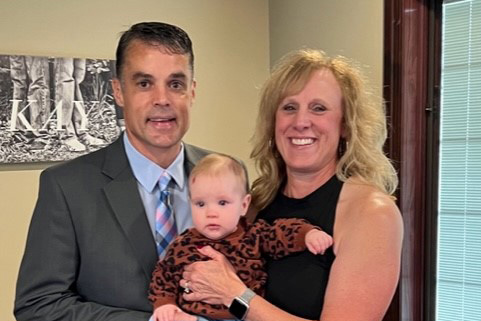
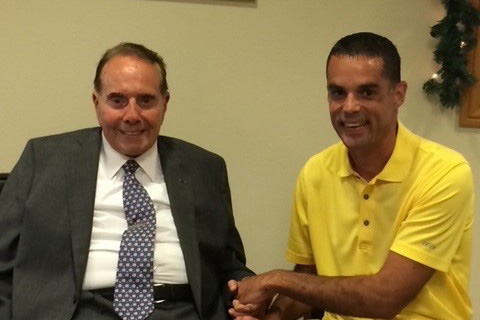

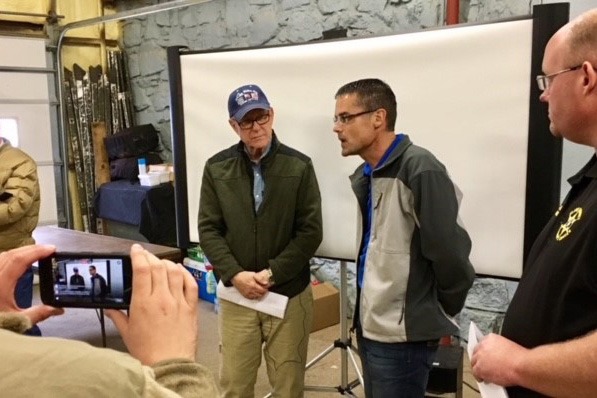
Tested by Fire
Kendal Kay
President & CEO, Stockgrowers State Bank, Ashland
Kendal Kay, President & CEO of Stockgrowers State Bank in Ashland, started his banking career on Oct. 23, 1995, after graduating with an accounting degree from Northwestern Oklahoma State University in Alva, Oklahoma. He started out doing the accounting for the bank, like the call report, IT and the holding company books. He then came up through the ranks by becoming President when he was just 29 years old. Since he had to work in all positions, this allowed Kay to know the process of how a check clears all the way through the bank.
Protection, Kansas, native Kay said it was hard to root for Ashland when he first moved there, so he decided to become involved more by being a part of the city council in April 1997. In 2009, Kay was ending his third-year term on the city council. He knew the current mayor wasn’t going to rerun, and he said it didn’t look like anyone else was going to step up to take the position. On a night before the deadline, Kay went home to his wife and said he thought he might run for mayor since it didn’t look like anyone was going to step up. His wife had said, “Well, you can run, but I am not going to vote for you.” Kay stated that while Karrie said that jokingly, she was always very supportive of him. In April 2009, Kay stepped into the role of mayor for Ashland. After 25 years of public service, Kay retired from his mayoral seat in January 2022.
Initially, Kay wanted to step down in 2017, but Ashland was struck by the Starbuck Prairie Fire, so he decided to stay on.
This fire had caught high winds and rode waves of desiccated plant material up from Oklahoma. It consumed nearly 663,000 acres, killed unknown numbers of livestock, destroyed 40 homes and claimed one life. Kay was tasked with helping rally community resources, and Stockgrowers State Bank contributed significantly to the efforts.
Kay stated in an interview with Ingram’s 50 Kansans You Should Know in 2018, “We were tasked with an enormous challenge of survival, and then the massive effort and responsibility of recovery. Those who call Ashland home rose to a new level of excellence.”
His key advice to anyone wanting to run for public office is to have no personal agenda but to just care to better the community in which they serve.
“You need to learn how to work with people to make things happen,” Kay said. “Government is hard; even if you are at the city of Ashland level, you are still the government. People pay their tax dollars and want things to be run responsibly.”
The experience of running the business of the bank did pay dividends in helping lead the city and to be a good steward of taxpayer dollars. It wasn’t always easy, but Kay and the city administration always worked together to find a solution despite differences when making decisions.
“In many ways, we’re all trying to do the same thing, and that is growing our community and bettering our community,” Kay said. “When you work with people and sometimes you just flat don’t care who gets credit, it’s amazing what can get done.”
One example would be the electric, water and sewer infrastructures that cost thousands of dollars to maintain. Kay said you don’t want to just maintain, you want to improve as well, but the city can’t afford to replace whole systems. But doing things to upgrade every year helps in improving the overall structure and can make things better for the future and for the next generation.
One of Kay’s challenges as mayor was being too accessible. But he said he was fortunate enough to work for community bankers that not just care about their community but want to see their community succeed, and so they gave him the opportunity to serve their local community. It was a full-time commitment, and there were always interruptions during the day, seeing as the bank was just right across the street from city hall.
Another challenge was just always trying to be fair. Kay said that you can’t please everyone dealing in government, so you want to come up with the best solution.
In 2016, the city wanted to build a new hospital. The hospital board came to the city administration and wanted to establish a public building commission so they could issue bonds for it. The revenues from the hospital would then go to pay for the bonds. It all sounded fine, but certain people didn’t want it to move forward. After many meetings, the decision to build was finally put to a vote by the public. This wasn’t easy, but the vote passed 70-30, and the city of Ashland is grateful to have a new hospital in their community.
Besides being mayor, Kay has had the opportunity to serve in other capacities as well. He served on the Bankers’ Bank of Kansas board from 2010-2016, the KBA Board from 2009-2012, and was in the third KBA Bank Leaders of Kansas (BLOK) class in 2008. He currently serves on the Board for Ashland 2020, Inc., Ashland’s 501C Fitness Center, United Methodist Health Ministry Fund Board of Directors, and is a member of the KBA Federal Affairs Committee.
Kay enjoys spending time with his family. He and his wife Karrie have four children: Sloan (and son-in-law Kole), Reece, Braton and Kinley and one granddaughter Kora.

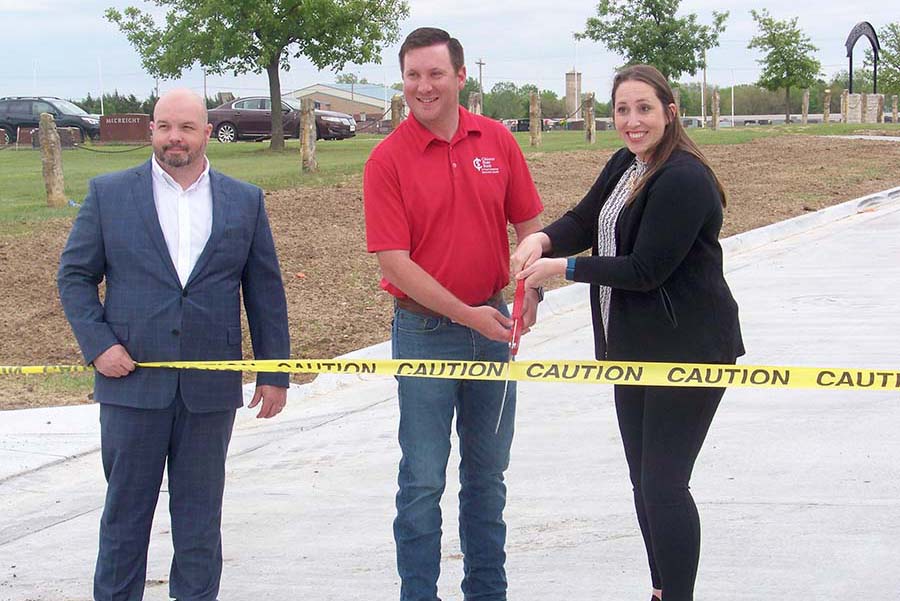

A 30,000-Foot View
Mark Kennedy
Assistant Vice President & Trust Officer
Citizens State Bank & Trust Co., Ellsworth
Mark Kennedy is the Assistant Vice President & Trust Officer at Citizens State Bank & Trust Co. in Ellsworth. After graduating from the University of Kansas with degrees in sports management and marketing, he was offered a job back in his hometown of Ellsworth with the bank as a Trust Officer in Training in 2012.
Kennedy was approached shortly after he moved back to Ellsworth in October 2012 by the then-mayor because there was a vacancy on the city council. He was appointed by the mayor in October of that year to fill the vacancy for the rest of the term. Kennedy was re-elected to that council seat in November 2015, and his next term went into effect from January 2016-December 2019. He wasn’t intending to run again, but in November 2019, with just two months left in his term, the current mayor decided to resign. Since Kennedy was the Council President and per council code, he needed to step in and fill the unexpired term. He went from two months left on his term to two years from November 2019 until it ended in December 2021.
In wearing both hats as mayor and a full-time banker, Kennedy used his experience in the trust industry to deal with the stress that came up from being in both jobs.
“You could get caught up in the day-to-day noise, but you really have to be diligent by taking a 30,000-foot view out of everything and look at everything as a process,” Kennedy said.
In dealing with the stress of being mayor, Kennedy looked to his experience in his bank’s trust department. Some stressful examples might include helping with an individual’s retirement funds. Different phases of a client’s life bring about unique challenges, whether he or she is in the accumulation phase of retirement planning or entering the distribution phase. Decisions we make every day can have a huge impact on the rest of a person’s life.
Kennedy said he thought his experience equates well in government because a) how slow things can move and b) little things can happen every single day, such as hiccups in city projects. He said he wouldn’t let the little issues become bigger by worrying all the time about every single little thing that came up. “Don’t get me wrong, they’re important,” Kennedy said. “But you have to look at the whole thing as a process, and the ultimate goal is where you want to be at the end of a project.”
His experience in banking specifically helped with the financial aspect of city government. Kennedy said that in small rural communities, they needed to really rely on individuals expertise and the makeup of their council. When he was mayor, they had an individual who was an engineer, another that worked for the local power company and one who was an extension agent.
“There’s no way you can know everything about every different topic, so you need to lean on those individuals,” Kennedy said. “For me, my role as a banker really helped us out when we were talking about financing projects, the timing and issuing of debt, our financial advisors and going through the bond indentures and various things like that. Hopefully, my work in areas like that daily made that process a lot smoother for everybody else.”
When working with people, Kennedy said banking and mayorship ran parallel. People are at the forefront, whether it is citizens at the city council or their customers in the bank. He had to find a way to work with people, even individuals he might not have agreed with or maybe had a rocky relationship with in the past, to find common ground. “People appreciate and respect you more if you are upfront and honest and act with a high level of integrity,” Kennedy said. Ultimately, he said that people generally understood that he was in it to see the community succeed, and they were willing to work with him.
Shortly after becoming mayor, Ellsworth was without a city administrator for about six months. During that six-month period, Kennedy said he felt like he was doing double duty. He had to put his head and time together with the City Attorney and the City Clerk to do the role of the City Administrator while that position was vacant. “The bank was very gracious,” Kennedy said, and there were times when he felt like he was giving too much time to one and not the other. When they found the right person for that position, it made that situation so much better. This was also during the time the COVID-19 pandemic hit Kansas, and communities needed to quarantine to fight off the virus.
“One thing I told incoming council members throughout the years I was on was you have to be willing to put in the time,” Kennedy said.
Kennedy is an alumnus of the KBA Bank Leaders of Kansas (BLOK) class of 2017. This opportunity was a neat carryover for him to fill the shoes of the mayor. “It was immersive on both federal and state side of things,” Kennedy said, “to not only be able to work with Steven Johnson (who was the Kansas State Representative at the time) but get to know him through BLOK but also through work on the City Council and ultimately then as Mayor.” And on the federal level, Kennedy was able to get to know Senator Jerry Moran throughout that period where Moran would even pop into the bank on a Friday and chat with Kennedy to catch up. BLOK helped Kennedy get a leg up where, if he needed to involve their state or federal legislators, he had that relationship already established.
Kennedy stepped down from mayorship in 2021, he currently serves on the KBA Trust Committee as Vice President and has been asked by KBA’s Alex Orel, SVP — Government Relations, to come to speak to current BLOK classes the last several years during one of the sessions. Kennedy and his wife, Emily, have one daughter Patton and another on the way!
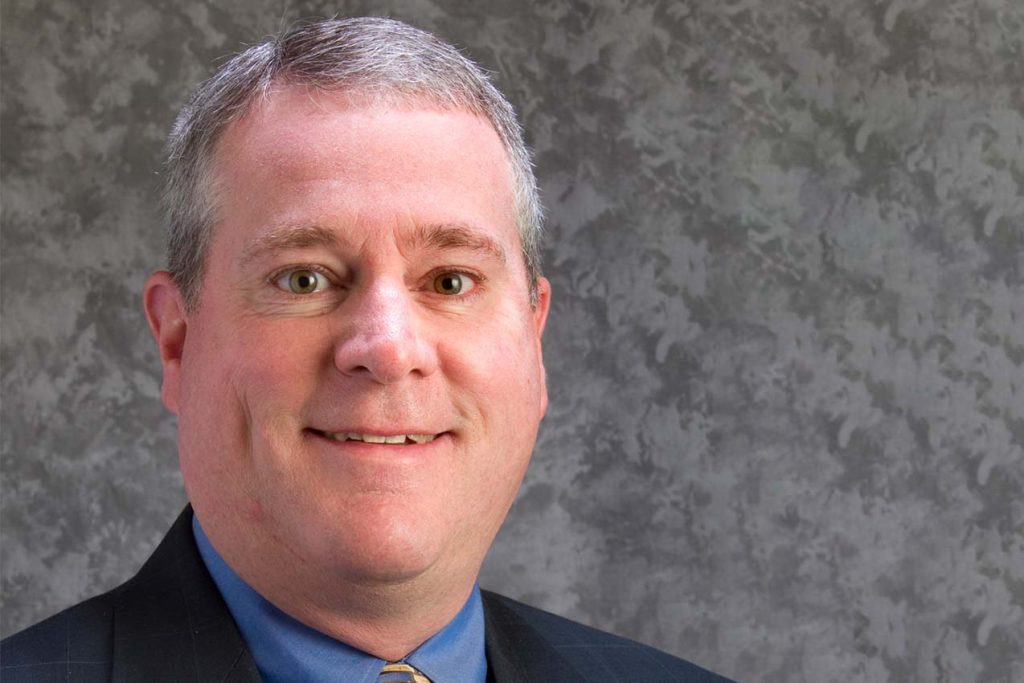


Three-Legged Stool
Michael “Mike” A. Boehm
SVP — Commercial Banking, Commerce Bank, Lenexa
Michael “Mike” A. Boehm, SVP of Commercial Banking at Commerce Bank in Lenexa, is now the longest-serving mayor in Lenexa’s history and has run unopposed in all subsequent elections since 2003 until he is set to retire his position on Dec. 5, 2023. After graduating from the University of Kansas in 1982 with a bachelor’s degree in business administration, Boehm started his banking career at First National Bank of Olathe as a teller, loan clerk, consumer loan collector, and finally as an assistant loan officer of consumer loans. He then moved to the Lenexa National Bank (which was acquired by Commerce Bank effective Jan. 1, 1993) in September of 1985 as an AVP in the commercial loan department. From July 1991-April 1995, Boehm served on the Lenexa Planning Commission and then served on the Lenexa City Council from April 1995-January 2003. Boehm, a lifelong Lenexa resident, was initially appointed mayor when Joan Bowman was elected to step down due to health issues. The council retained him for the remainder of her term before he sought his next term in April 2003.
According to Kansas City NBC affiliate 41 KSHB, during Boehm’s time as mayor, Lenexa has grown by an estimated 50% surpassing 50,000 residents and approaching approximately 60,000, to become the eighth largest city in Kansas. During his mayoral tenure, the city has built a rec center and public market; expanded City Center, adopted body-worn cameras for police in 2009; opened a new fire station; improved the city’s financial rating to Triple-A (or AAA), upgraded Lenexa’s parks and roads; and broke ground on a new justice center among other accomplishments.
“We are indebted to Mayor Boehm for his amazing contributions to Lenexa,” Lenexa City Manager Beccy Yocham said in a statement to 41 KSHB. “He is a visionary leader who inspires the best in the people, and our community has grown immensely under his leadership.”
His experience in banking helped with managing the city’s multi-million-dollar budget, projected to be $224.8 million in 2024, which is adopted every year. The knowledge of how he finances bank deals and how deals need to make sense has helped him with the designing, negotiating, and approving economic development incentive packages to encourage growth and development of the city. He said the budget is the most important thing that mayors and their councils along with staff do every year, and it applies to whether you’re a small town or a large city, whether you’re expanding or contracting.
“If you’re a growing community, understanding how that works and having relationships with developers, attracting businesses and incoming development is very important,” Boehm said. “If you’re not helping grow your community, your bank opportunities are limited as well.”
Boehm said it is very rewarding to be a part of a great team and that it’s like a three-legged stool. They have the elected, the staff and the voters, and they all must get along and listen and work hard together for the good of everybody.
“Every mayor you talk to will have that same thought process; the council and the mayor are representing the community, and the staff implements the vision,” Boehm said. “If you’re not all working together, then one is going to fall.”
Mike is actively involved in community, city and state organizations involved in municipal policy and leadership. He serves in several public and community service organizations, including:
- Johnson County Community College Foundation Board Executive Committee (July 2019-present)
- Greater Kansas City Chamber of Commerce Board of Directors (June 2019-present)
- KBA State Affairs Committee
- Mid-America Regional Council Board of Directors (January 2018-present)
- Johnson County Research Triangle Authority Board (2009-2015 & 2021-present)
- Johnson County Community College Foundation Board of Directors (2015-present)
- League of Kansas Municipalities Board of Directors (President 2005-2006)
- Lenexa Chamber of Commerce Board of Directors (ex officio) (2003-present)
- Lenexa Chamber of Commerce (Lifetime Member)
- Johnson County Community College Carlsen Center Program Advisory Committee
- Lenexa Historical Society (Lifetime Member)
- Holy Trinity Catholic Church
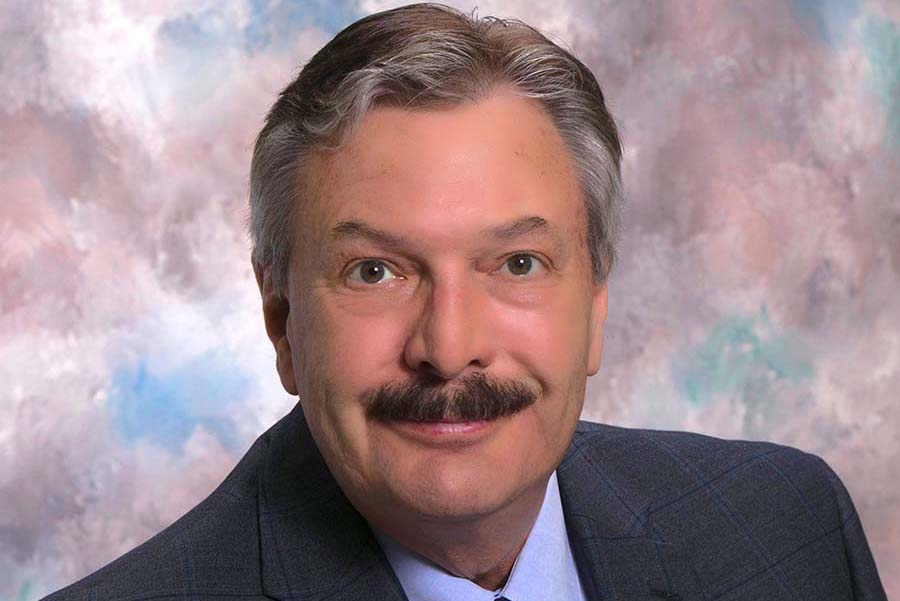
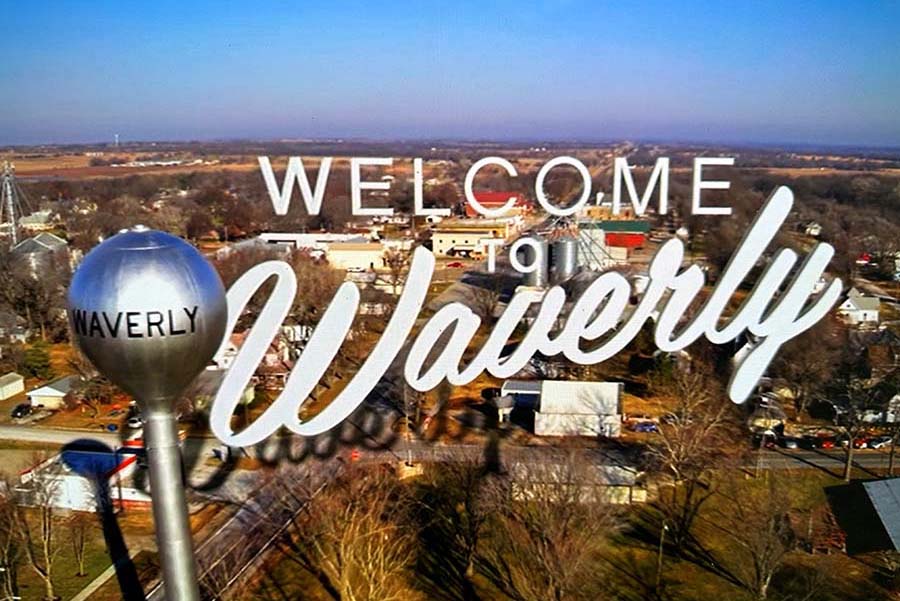
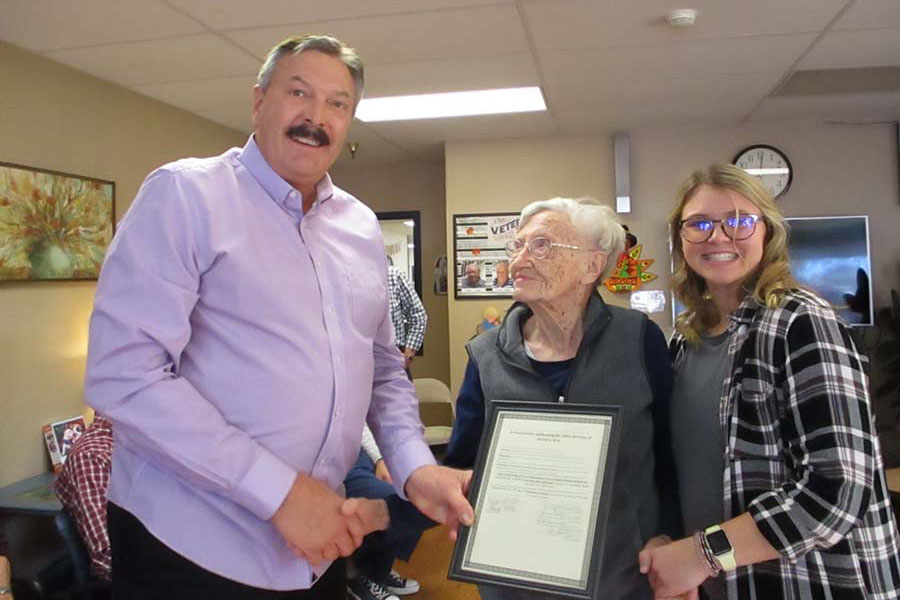
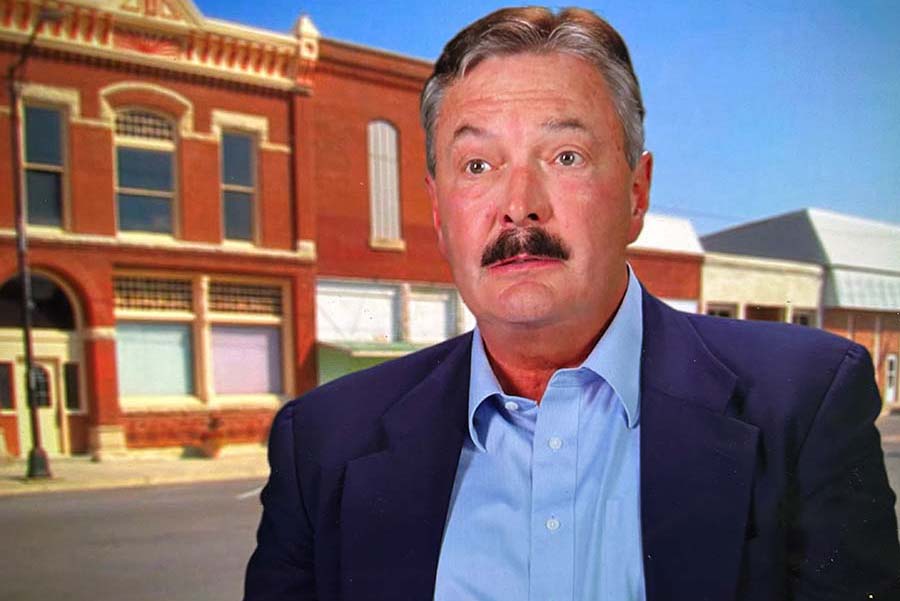
Welcome to Waverly
Craig Meader
CEO & Chairman, First National Bank of Kansas, Waverly
Craig Meader, CEO & Chairman of First National Bank of Kansas in Waverly, began his banking career in 1981 after graduating from Kearney State in Kearney, Nebraska, with his bachelor’s degree in business administration and finance. At only 23, Meader became the youngest bank President in Kansas at the time. Meader’s father had bought First National Bank of Kansas in 1965 in Waverly, where he ran it as President & CEO until the time of his passing when Craig was only 15. Meader not only lost his father, but the town lost their community banker, public servant and friend. While Meader was growing up, he fondly remembered the townspeople stepping in to help serve in the father role after his father’s passing, which helped him grow into the man he is today. This inspired him to later join the Waverly City Council in 1987 and then step into the role of Mayor in 2003 until he retired in 2019.
“My biggest inspiration was my father,” Meader said. “He did a lot for Waverly, including a nursing home and an exit for the town off I-35. He bought a $1.5 million bank on a Friday and closed the deal on the following Wednesday, and doubled its size in a year; you can’t do that today. He passed at age 43, and basically, my mom and dad’s friends and community raised me. I learned a lot of community responsibility.”
Throughout Meader’s 16 years as Mayor, he relied on his experience in banking to help with understanding the town’s numbers as this was the number one deficiency on the council, and they looked to him when there was a money question on the table. Meader said that as a community banker, he was able to serve a wide variety of customers and was engaged with both his state and national politicians. This helped when applying for grants and financial assistance for the city.
With the bank being right across the street from City Hall, Meader had a full plate to balance as both a full-time community banker and as the town Mayor that came with both successes and challenges. Meader would approach every situation with an open mind to listen to the diversity of comments and questions. He said that being a country boy, he could easily sniff out BS a mile away and was never shy about stepping forward and putting a stop to some crazy requests. He used the mindset that regardless of any circumstance if you are steering the city in the correct financial direction and at the same time maintaining a social/aesthetic balance, it would keep the city a place people would want to live.
Leading the town on certain aspects also came with much opposition. Meader said that he would educate himself on every issue from every angle to prepare for questions from his constituents. His greatest fear was communicating with folks who “don’t know what they don’t know,” and that blind ignorance could be very dangerous.
One example of this would be a proposal from the Bravo TV network, which wanted to do a documentary called “Welcome to Waverly” on the town in 2018. They brought in eight totally diverse strangers to partner up with citizens from their community in similar jobs such as politics, real estate, BBQ, beautician, etc.
“Well, I had a big no from a strong minority of citizens on the proposal,” Meader said. “We had a majority of the town to support the idea, so educating the ‘hell no’ folks was a challenge.”
The project was a resounding success, and the three-part show is still in the library to view at Bravotv.com.
Throughout his time as mayor, one of his successes was seeing the finalization of the Heck Additions for the future building of the town. It had started while he was on the council and finished early in the mayoral role. He is hoping the current city council will do phase two as they will need room for expansion as Waverly continues to grow and be vibrant.
Meader’s greatest accomplishment overall is his family. He and his wife, Peggy, have two children, Paige and Payton, who’ve made all the unheard-of work worth it. Besides his many years of public service and still continuing to serve as a full-time community banker, Meader was also KBA Chairman in 2002-2003, Bankers’ Bank of Kansas Chairman 2010-2011, served on numerous ABA boards and the ABA Board of Directors, The KBA Board of Directors, KBA Federal Affairs Committee, Coffey County Economic Development Committee, FHLBank Topeka Board, and many more.






